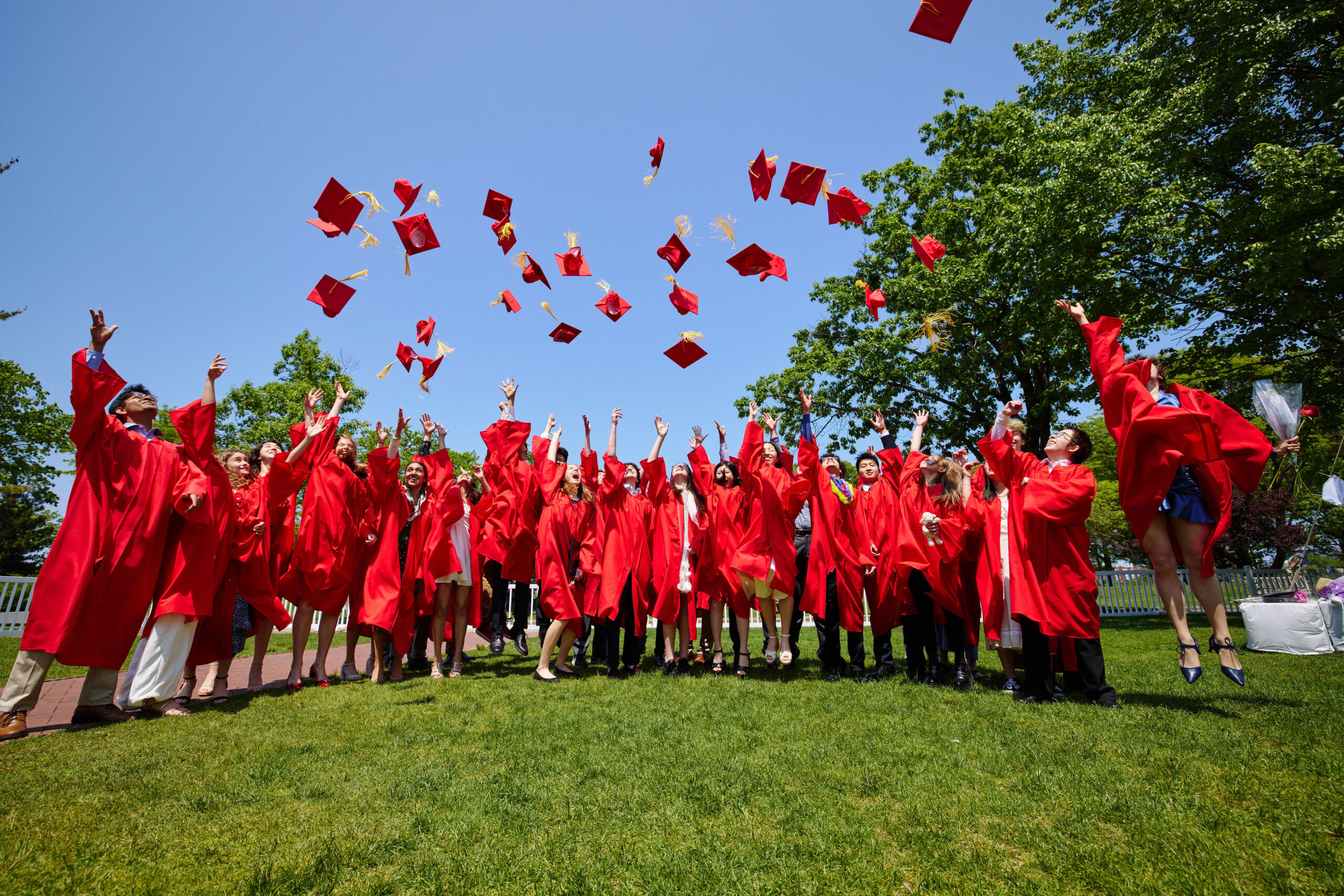News
Exploring Adventurously
I walked out of the BUA building one morning last week with three of our seniors, each of whom was on the way to a different BU class. One was headed to a history course: Magic, Science, and Religion. She was finding it fascinating and contrasted her reaction to that of many of her BU classmates, who admitted to taking it to fulfill a core requirement. Another student was on his way to an American literature course, which he described as a great opportunity to build on the novels he had read last year in his BUA English course. The third was bounding off to Cosmology; she shared that the course made things tough on her schedule, since it backed into soccer practice, but the material was too interesting to pass up!
Our mission describes BUA as a place where students can “explore adventurously the wider world of learning at Boston University.” It is such a joy to watch our students do that. Young kids start out so curious, but schools sometimes have the effect of squashing that passion for learning along the way. I am so glad that there is a school like this – filled with kids whose flame burns bright and with a culture that celebrates that kind of joyful inquiry. Now, off to class!
Letting Students Lead
Last year, we formed a committee – led by students and including several members of the faculty – to generate ideas for how to improve the senior experience, with a particular focus on encouraging senior connections with younger students and with life in the BUA building. The group made three recommendations, all of which have been implemented: hosting a senior retreat, which took place on Thompson Island in late August for some early bonding before a busy fall; bringing much-needed new furniture into the Junior-Senior Common Room; and designating the Quiet Study Room, formerly open to all students, as a place for juniors and seniors to work between BU classes rather than going to the BU library and other spaces up and down Comm. Ave. It’s all working! Despite a rainy day, the energy at the retreat was positive and fun, and it has continued into September. We are seeing many more seniors in the BUA building all throughout the day – whether they are piled on the new couches in the JSR or studying Differential Equations in the QSR. We are all better for having our seniors happy, connected, and close by.
One of the challenges with the Quiet Study Room in the past has been keeping it quiet; students understandably wanted to talk and joke, which was sometimes loud and disruptive to others trying to study or to students in the English classroom next door. We adults had frankly failed to solve the problem. So, we turned to the students – and they have (so far) fixed it! They announced a witty rebrand of the QSR to the CIA (Considerate Independent-study Area), borrowing wording from quiet spaces in the Mugar Library that students are already familiar with. They designed and placed reminder placards on the tables in the room about the noise expectations in that space. They even posted a public service announcement on the Student Council Instagram. They are owning the change, and it’s working.
When we listen to students and empower them to build the kind of community they want to be in, we all move forward together. They have a lived experience we adults simply don’t have. They understand things we don’t. They can tell us what they need. They know how to inspire their classmates. They understand how to change the culture. And they learn that they are capable and powerful agents for positive change – an insight they will carry with them beyond these walls. I could not be more proud of our seniors, more grateful for the tone they are setting for all of us this year, and more optimistic about the months ahead.
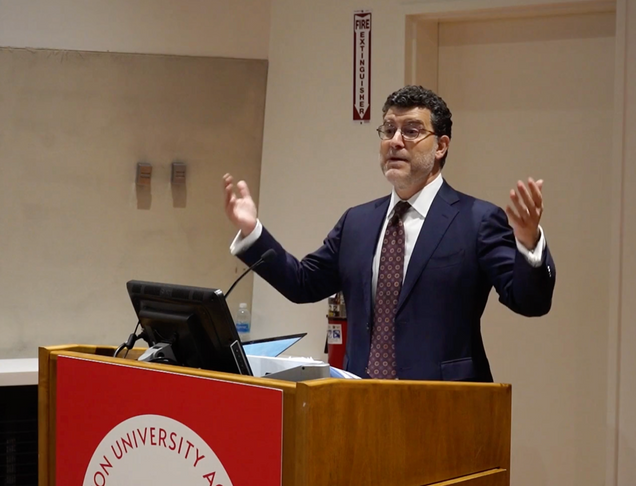
“On Grades and Mindsets”: Opening Day Remarks from Head of School Chris Kolovos
On September 5, 2023, Boston University Academy Head of School Chris Kolovos welcomed students, faculty, and staff back to school with the following remarks "On Grades and Mindsets." You can watch the full recording of Mr. Kolovos's ASM remarks at this link.
****
Good morning. It is lovely to see you all today. On behalf of the faculty and staff, welcome to this 31st year of BU Academy.
A special welcome to our new students. You are impressive individuals, but what binds you together is your curiosity and your kindness. That is also what connects you to all of us. You make us better, and we are so glad you are here.
An extra special welcome to the class of 2024. You have earned a reputation – a good one – for being cohesive and inclusive. That was on full display at the senior retreat, where I watched your friend groups mix and morph over the course of one meal. You have also earned a reputation for being engaged and for trying to make this school better; we will all see evidence of that today from two of our Student Council leaders. You all are one of the reasons I'm so optimistic about this year, it is going to be a great one.
In just a few moments, you will hear from Anais, our Student Council president. But first, I'll offer some thoughts as I do at the start of every year.
My topic today is a rather serious one. I am going to talk today about the pressure that some of you feel to achieve academically – the oftentimes unhealthy focus on grades. Now, I am not saying that this is a BUA-only phenomenon or that this concern applies to all of you all of the time. Certainly not. In many ways, we are beautifully counterculture. So many of you exhibit a deep, abiding love for learning; curiosity is a thread that runs through this community, often overcoming a hyper-focus on grades.
But we are not immune to this phenomenon. It is something I worry about. The good news is that there is something we can do about it. Some of you will resist what I have to say. At your age, frankly, I might have too. Still, I wish somebody had said it when I was in your position, and I hope I would have listened.
Learning as Play
After that dour note, I'll begin with something happier. At home right now, I have a front row seat to how babies and toddlers learn. Those of you with young siblings and cousins know this too. Maggie and Penny, our twins, are nine months old. They are learning how to walk. Right now they are at the stage where they crawl over to the couch, pull themselves up to stand, and then almost immediately land really hard on their backsides. My wife and I talk about lining the house with pillows and bubble wrap. But the girls just laugh hysterically and try again.
Our son Charlie, is three years old. He's a verbal little guy; we have lots of fun conversations. But neither of us taught him how to talk. He learned by trying and by messing up over and over again. Over time, “ut” became “up.” Where are them?” became “Where are they?” “Mys” is becoming “mine” (although I have to say I don't blame him for that one; “mys” makes so much more sense when you think about “ours” and “yours” and “his” and “hers”).
Kids are amazing. They're just not afraid to make mistakes. They don't see mistakes as failures. They don't say, “I'm so embarrassed about my grammar.” They don't say, “You know, walking is overrated. I'm not really a walking person. I'm just gonna crawl.” For them, learning is play.
So What Changes?
And then somewhere along the line things change, and not in a good way. Learning stops feeling like play and feels more like work. Learning becomes stressful and can provoke anxiety. Schools have a lot to do with that. This is not your fault. Particularly when we start giving grades, students can fixate on those measures – fixate on those grades, scores, and honors.
I started down this path early. I remember – and this is family lore – that I cried in the first grade when I received an A-. In the second grade, I remember the name of the student who beat me at a multiplication contest. I remember in the seventh grade, when I started at private school, the string of B's and C's on my report card – grades I had never seen before; I remember feeling like an imposter in those moments. And, for some reason, I kept all of my report cards and standardized test score reports in a little treasure box in my parents' closet.
The research shows that this is not healthy. This anxious hyperfocus on grades leads to really pernicious outcomes. It squashes curiosity. It discourages risk-taking. It discourages asking for help when you need it. It actually makes your performance worse. It can have negative mental health outcomes, especially when you are measuring your self-worth by letters on a report card.
It can even lead someone to put their character at risk by cheating. A fellow head of school shared a particularly sad example. She told me that one of her students cheated on a placement test. Mind you, there are no reportable grades on a placement test. Cheating on a placement test actually makes it harder for a student to succeed. When she asked the student why, the student said, “I wanted to do well.”
The question is, why does this happen? How do we go from happy, mistake-making, giggling toddlers to people who worry so much about outcomes, even for deeply curious and strong students like you? There are certainly external factors, and I do not want to downplay those: college, parents, and society more broadly. I will address those. But I suspect that the biggest driver for many of us is internal.
Grades and Growth Mindsets
I would like to tell you a story about a friend of mine from college who was a star in high school. She went to a school very much like this one, was at the top of her class, and went to a name-brand college. And she loved math. In her freshman year of college, she earned an A in multivariable calculus and differential equations in the first semester and then an A- in linear algebra in the second semester. That course was hard for her, but rather than being proud of her A-, she took it as a sign that she had reached her math limit. She never took a math course again. She decided to major in environmental science – a field aligned with her passion and where she thought she would be able to do some good in the world. In her sophomore year, she earned a B in a course in her major. Not used to seeing that grade, she took it as a sign that she would struggle and switched majors to safer ground.
Like so many strong students, she learned the lesson early in life that she was smart – good at school. That was part of her identity. She received a lot of praise for that. She was really proud of it. The string of A’s she received along the way was evidence that she was smart and good at school.
And that’s just the problem. If an A means that you are smart or good at something, what does it B mean? What does an A- mean? Lower grades must mean that you are not smart, not good at something, and that you have maxed your ability. You should not take the next challenge because you might fail and expose your weakness, with consequences for your identity and your self worth.
What she was exhibiting was a clear example of what is called a fixed mindset. The research here is fascinating. One of the leading thinkers in this area is Dr. Carol Dweck at Stanford. Her work describes two categories of people. In one category are people with what’s called a fixed mindset, who tend to believe that traits are fixed and stable over time – things like your intelligence and mathematical ability. Those do not fundamentally change; you are born with them. By contrast, people with a growth mindset think very differently. They view traits as changeable over time. You can get smarter and more skilled through effort.
What is fascinating about the research is not the categorization; it is the outcomes. The research shows that people with a fixed mindset, controlling for all other factors, tend to perform worse than people with a growth mindset. Those with a growth mindset tend to perform better. For example, researchers tracked students with growth and fixed mindsets over time in math and found that students with a growth mindset ended up in higher levels of math years afterwards as they progressed through their education.
It might seem surprising that the way we think about learning impacts how well we do. But consider feedback and how we respond to mistakes. In response to a low grade, people with a fixed mindset often look around to see who did worse than they did and then feel a little better about themselves. They stick to areas where they can really excel and put their effort there. If you have a growth mindset, what do you do with a mistake? They are not scared of the result, but see it as a chance to learn. They ask for help. They try harder and see what their effort can accomplish – just like every toddler.
Retraining our Brains
Here's the good news: we can control our mindset. We can develop a growth mindset and we can change the way we think about grades.
We are working on this as a school. Last summer, the faculty summer read was a book called Grading for Equity. Since then, we have been talking a great deal about our grading practices, our grading policies, what we want grades to mean, and how we telegraph that.
Classically, grades have been seen as sorting mechanisms. We reject that. We have no honors and non-honors tracks to sort you into. We have no class rank. We do not grade on a curve.
The purpose of grades, for us, is not to tell you if you are good at Latin or whether you are better at math than the student sitting next to you. It is to answer one simple question: can you do the things we're asking you to do right now? Can you do all of them? Can you do some of them? How well can you do them? A grade is a diagnostic snapshot at a moment in time to tell you whether your effort is producing the results you are hoping for. And it is a guide to where you might want to work harder and ask for help.
Now, this does not mean you should not care about your grades. Of course you should – but not as a confirmation of some fixed ability or some innate skill. Take a grade as feedback. “Is what I'm doing for homework working? Where do I need to improve?” I also do not mean to suggest that talent does not matter. We all have natural strengths – of course we do. But we can all improve, and grades can help us do that if framed the right way.
This is perhaps the only time this year I will make a sports reference. It’s a story about Michael Jordan, who was, as some of you know, cut from his varsity basketball team as a sophomore in high school. He was placed on the JV team to develop. Worse yet, when he looked at the varsity roster, he saw the name of one of his classmates – another sophomore. Jordan's reaction famously was that he simply was not as good as the other players at that moment. Notice how different that is than “I'm not a good basketball player.” He also has said that getting cut was the best thing that could have happened to him because it led him to respond with effort. Effort and a growth mindset became lifelong habits for Michael Jordan, helping him become arguably the most dominant basketball player in history.
College Myths
Some of you are likely thinking, “Come on, Mr. Kolovos. There's an enormous pachyderm standing in the corner: college. Colleges care about our grades. They are not looking at our effort. They don't care how hard we try. They are just looking at the scores and the letters. Of course we're gonna stress about it.”
True. You're right. Colleges have become very selective, especially the places you all tend to want to go. Selectivity rates have plummeted as applications have increased. 8% admission rates are 92% rejection rates.
Scores and grades are important factors in college admissions, but I’ll suggest that they should not cause the distress that they do. There are four myths I want to unpack for you briefly.
One myth is that stressing about grades leads to better outcomes. That's nonsense. Stress makes outcomes worse. Anybody who has ever had a moment of test anxiety knows this. What helps is being open to feedback, learning, and bouncing back; that actually produces higher outcomes and the transcripts you may want.
Myth number two: we at BUA are competing against one another for a limited number of slots at these selective schools, and so small differences in GPAs matter. Nonsense. I can tell you that in one year, Brand X college admitted four or five BUA students. In the very next year, they admitted zero. They do not have a quota. If they want you – if they see something in you that they really like – they will admit you. They do not care about how many of you are applying to their school.
Myth number three: all colleges care about is grades and scores. I've talked to about three dozen deans of admission at the most highly selective colleges and universities in the country and I have asked them about how they read your applications. They turn away hundreds of valedictorians with perfect grades every year. What they are really looking for is a combination of students who can do the work at the college level, who are on fire with curiosity, and who have shown an inclination to connect that curiosity with something that matters – showing the promise to have an impact on their world. You all are in an almost unique position to do those things, and that is why they tell me that they love reading your applications.
The most pernicious college myth, though, is that going to the most selective college you can is a predictor of success and happiness. The research does not support that. What does matter is what you do when you are there. Who are the professors you meet? Who are your friends? What research do you engage in? What classes do you take? And I'll tell you that after a while nobody cares where you went to college. It is often the most insecure adults who remind you of where they went to college later in life. Pick a place you love and a program you connect with.
Parents
Some of you may have noticed that I have not talked much about another important piece here: parents. You might say, “Come on Mr. Kolovos, you're ignoring my parents, who really want me to excel. I have to get the grades.” For some of you, that parental pressure may be explicit. For others, likely for many of you, I'm guessing that the pressure is implicit or internalized. Even if your parents tell you to just do your best, you might feel some pressure to live up to the standard they set when they were in school. Or maybe, like my parents, yours did not go to college, but you feel the pressure to establish the family and do as well as you can on your family’s behalf.
I have two things I’d like you to think about when it comes to parents. One, if your parents seem anxious about your grades, scores, and college, have some empathy. It often comes from a desire to give you a happy life. They are just not sure how to do that. Here's why.
A psychologist I deeply admire shared the following thought experiment. Think about a time ten generations ago and what our lives looked like. It would have been fairly easy for parents to ensure your success because the future was much more predictable. You would likely live in the same village or town that your parents lived in. You would likely marry somebody from that village, and perhaps the marriage would be arranged. If your parents made fishing nets, you would have been very likely to learn that trade at their feet and take over the business.
Now, who knows where you are going to live? It could be anywhere around the world. You might meet your partner online. Your job could be anything; it might not even be invented yet. Your family cannot prepare you for that. And that's unnerving for parents. What they are trying to do is give you all the advantages they can in that great cloud of uncertainty. They sometimes see grades and college as something they can control in order for you to be happy.
Deep down, they just want you to be happy. I know this because I have asked them. I talked to the parents of about fifty incoming ninth graders during the month of August and asked them what their hopes are for you. Not a single person mentioned grades. Not a single person mentioned a college list or a career. What they said was that they want you to stay curious, find great friends, find great mentors, be challenged, grow, and be happy.
So, one piece of homework for all of you. When you go home tonight to your parents, to your guardians, to your family, ask them what their hopes are for you at BUA and what they hope for you beyond this place. Listen with an open heart. Tell them about your hopes. And then give them a hug and tell them you love them.
*****
I wish you all a great year. Thank you very much.
Congrats and Good Luck, Class of 2023!
As summer wanes and back-to-school energy fills the air, we are wishing our most recent graduates the very best of luck as they embark on the next step of their journeys at college and beyond.
As you can see from the impressive matriculation list below, the members of the BUA Class of 2023 have exciting paths ahead of them. Watch out, world -- these talented, passionate, determined young people are ready to make their mark. To our newest alums: we couldn’t be prouder of you. Stay in touch, drop us a postcard from your adventures, and don’t forgot to stop by for a visit when you’re in town — you’ll always have a home at BUA.
Members of the BUA Class of 2023 will attend the following institutions this fall:
Barnard College
Bentley University
Boston College
Boston University (11)
Brown University
Bryn Mawr College
University of California – Berkeley
University of California – San Diego
Carnegie Mellon University (2)
University of Chicago
Cornell University (2)
Dartmouth College
Harvard University (2)
Haverford College
University of Maryland – College Park
University of Massachusetts – Amherst
Massachusetts Institute of Technology (2)
McGill University
New York University (2)
Northeastern University (4)
Northwestern University
Oberlin College
Oregon State University
University of Pennsylvania
Smith College
The George Washington University
Tufts University (2)
Williams College
Yale University (3)
The Many Side Projects of Dr. Brett Abigaña
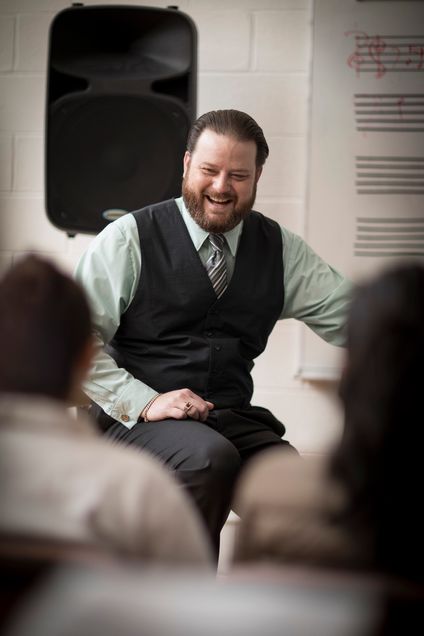
In addition to being BUA's longtime and beloved music teacher, Dr. Brett Abigaña is a nationally-known, highly in-demand composer and conductor who crisscrosses the country (and beyond!) showcasing his talents. In the past year alone, hiss work has taken him from Hawai’i to Mystic, CT, from the hallowed chambers of Carnegie Hall to the toes-in-the-sand amphitheater on Cape Cod’s National Seashore.
In December of 2022, Dr. Abigaña traveled to Chicago to present his music at the Midwest Band and Orchestra Clinic, and in February did the same at the California State Music Educators Conference, where he met conductors and educators from all over the west coast, had performances of his music, and discussed new projects.
A new music podcast, “Off the Shelf,” was born from one of these conversations. The first episode has been recorded and will be launched in the coming months (stay tuned!). This summer, he was a guest on fellow composer Sergio Barer’s podcast “Let’s Talk About Music.”
In March of 2023, Dr. Abigaña traveled to Honolulu, Hawai’i as the Composer-In-Residence for the Pacific Basin Music Festival, a position he’s held for the past five years. The following month, he made a quick day trip to New York City to host the New York International Music Festival Concert at Carnegie Hall. He returned to Carnegie Hall this past June as Composer-In-Residence for the New York Sounds of Summer Music Festival, where his piece “At First Sight” had its world premiere.
In May, Dr. Abigaña received a commission from the US Naval Academy to write a piece commemorating the appointment of the female Superintendent of the USNA. The piece, a new oratorio tentatively titled “Athena’s Ascent,” honors women in leadership generally and in Naval leadership specifically, and will be performed in January of 2024 by the USNA Band and USNA Women’s chorus, along with a soprano soloist and the USNA Chapel Organ, the largest drawbar organ in the world. In preparation for this premiere, the USNA Admiral has ordered a complete inspection of the structural integrity of the USNA Chapel, a piece of which was broken off as a result of the sympathetic vibrations of the organ music Dr. Abigaña wrote for his last USNA commission. Dr. A. shares that “I’ve secretly been in touch with the organist, and he’s up for the challenge of breaking the chapel just a little bit more with some very loud organ music.”
Many teachers use summer months as a chance to rest and recharge. Not Dr. A. This year, the Cape Cod Symphony Orchestra commissioned him for a new piece to be premiered at their July 4th concert. Unfortunately, the concert was canceled due to rain; fortunately, it was rescheduled to later in the summer, which means you haven’t missed it! The piece is called The Lamp Beside the Golden Door, and will accompany a reading of “The New Colossus,” Emma Lazarus’s famous poem about the Statue of Liberty. You can catch this free concert on Thursday, August 24 at 7:00 p.m. at the National Seashore Amphitheatre in Eastham, MA; lawn chairs and picnics encouraged!
Kelsey Liu ’26 Earns Spot at US National Chess Championships
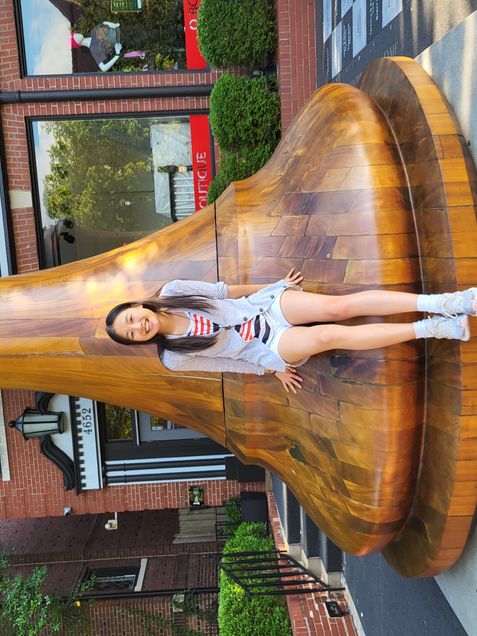 This summer, Kelsey Liu ‘26 defended her title as the girls state champion in chess, winning the Massachusetts Girls Championship with a perfect 5- score at the June competition in Boston. Her performance earned her a qualifying spot at the US Junior Championship hosted this month by the St. Louis Chess Club in St. Louis, MO. This invitational tournament features the top chess players in America under the age of 20, and Kelsey says she feels “Incredibly humbled and honored to be a part of this prestigious event.”
This summer, Kelsey Liu ‘26 defended her title as the girls state champion in chess, winning the Massachusetts Girls Championship with a perfect 5- score at the June competition in Boston. Her performance earned her a qualifying spot at the US Junior Championship hosted this month by the St. Louis Chess Club in St. Louis, MO. This invitational tournament features the top chess players in America under the age of 20, and Kelsey says she feels “Incredibly humbled and honored to be a part of this prestigious event.”
Kelsey placed 8th overall in the final standings, earning her $700 in prize money. She shared that "the tournament was really fun and I made some new friends there too. Although I didn’t do as well as I would have liked...I gained a great deal of experience and am determined to keep improving!"
Kelsey is currently ranked the #13 chess player among US girls under 21 and #16 for age 14 overall. She is pictured here with the world's largest chess piece in front of the World Chess Hall of Fame!
Jon Freeman ’04 Receives BUA Distinguished Alumni Award
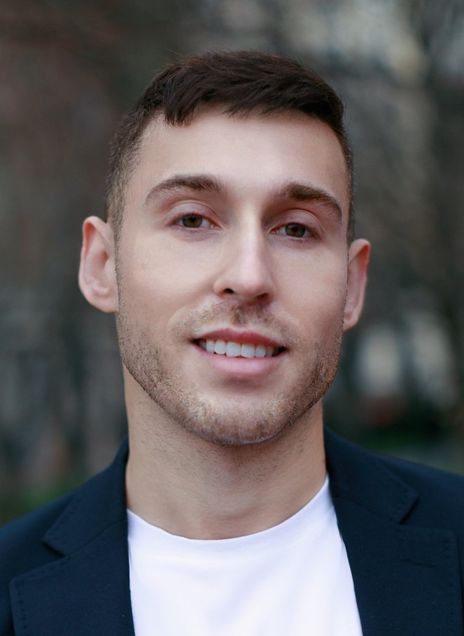 BUA is delighted to present the 2023-2024 Distinguished Alumni Award to Jon Freeman '04 for his groundbreaking work in social neuroscience and for his national advocacy for LGBTQ+ visibility and representation in STEM. This annual award, launched in 2022, goes to an alumnus/a who best exemplifies the values of BUA and has used those qualities to make an impact on the community and world around them. The inaugural recipient of the Distinguished Alumni Award was Magdalena Slosar-Cheah '99 for her work in the field of infectious disease.
BUA is delighted to present the 2023-2024 Distinguished Alumni Award to Jon Freeman '04 for his groundbreaking work in social neuroscience and for his national advocacy for LGBTQ+ visibility and representation in STEM. This annual award, launched in 2022, goes to an alumnus/a who best exemplifies the values of BUA and has used those qualities to make an impact on the community and world around them. The inaugural recipient of the Distinguished Alumni Award was Magdalena Slosar-Cheah '99 for her work in the field of infectious disease.
Jon Freeman is a social neuroscientist and associate professor of psychology at Columbia University, where he directs the Social Cognitive & Neural Sciences Lab. He received his BA from New York University in 2007 and his PhD from Tufts University in 2012. His research examines the human brain mechanisms underlying snap judgments, first impressions, and unconscious bias using neuroimaging, computational modeling, and behavioral paradigms. His work has made several discoveries, such as how the brain processes a person’s trustworthiness outside conscious awareness, or how stereotypes and prior social experiences can create distortions in the brain’s visual system. He also developed a novel technique that uses hand movements to uncover how split-second decisions unfold over fractions of a second in the brain, which is now widely used by the scientific community.
Jon is the author of nearly 100 peer-reviewed publications and the recipient of a number of awards, including the National Science Foundation CAREER Award, the Association for Psychological Science’s Janet T. Spence Award for Transformative Early Career Contributions, the Federation of Associations in Behavioral & Brain Sciences’ Early Career Impact Award, and other distinguished awards from the Social & Affective Neuroscience Society, the Society for Personality & Social Psychology, the International Social Cognition Network, and the Society for Social Neuroscience. His research is frequently funded by the National Institutes of Health and National Science Foundation and has appeared in media outlets such as the New York Times, Washington Post, Wall Street Journal, and TIME Magazine.
Jon is also leading national advocacy on the challenges that LGBTQ+ people face in the STEM workforce and on policymakers’ blind spots in resolving these disparities. Since 2018, he has been working to have sexual orientation and gender identity demographics incorporated into official data collection and reporting systems of the U.S. government and higher education that are used to ensure the equity and inclusion of underrepresented groups in STEM. He has raised public attention on these issues with op-eds in Science, Nature, and Scientific American, authored extensive formal requests to the government, facilitated the House of Representatives’ passing of the LGBTQ+ Data Inclusion Act on behalf of 90 scientific organizations, and regularly works with federal agencies and the White House on STEM diversity issues. Due to Jon’s efforts, for the first time since 1957 every graduating PhD student at every US university will soon voluntarily be asked their sexual orientation and gender identity on the government survey required to graduate. Such data will have the power to create transformative change in the equity of LGBTQ+ people in STEM and higher education. For this work, Jon was recognized as the 2019 LGBTQ+ Scientist of the Year by Out to Innovate for his “exemplary, cross-disciplinary scientific contributions and his public advocacy on behalf of LGBTQ+ people in STEM.”
We look forward to welcoming Jon back to campus this year to celebrate his many accomplishments.
Chief of Staff to Boston Mayor Michelle Wu Delivers Commencement Keynote Address
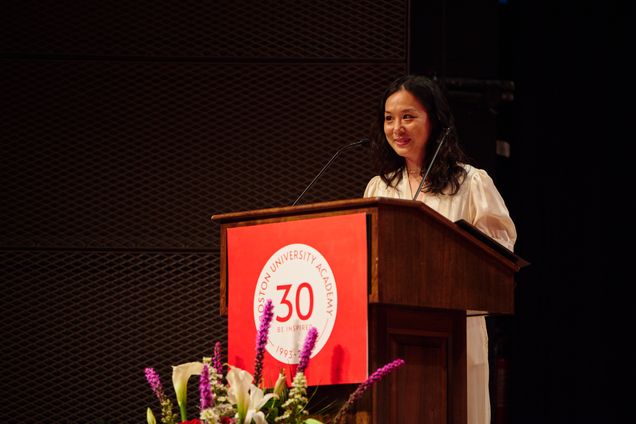 On Monday, May 22, Boston University Academy hosted its 29th commencement exercise at BU's Tsai Performance Center. The BUA Class of 2023 crossed the stage to receive their diplomas from Head of School Chris Kolovos and Associate Head of School Rosemary White. Giselle Wu '23 and Margaret Chu '23 recited the Classics orations in Latin and Greek, respectively. Sally Jamrog '23 and Condredge Currie '23 delivered the student addresses. Following the ceremony, graduates and their families celebrated with a reception under the tent on BU Beach.
On Monday, May 22, Boston University Academy hosted its 29th commencement exercise at BU's Tsai Performance Center. The BUA Class of 2023 crossed the stage to receive their diplomas from Head of School Chris Kolovos and Associate Head of School Rosemary White. Giselle Wu '23 and Margaret Chu '23 recited the Classics orations in Latin and Greek, respectively. Sally Jamrog '23 and Condredge Currie '23 delivered the student addresses. Following the ceremony, graduates and their families celebrated with a reception under the tent on BU Beach.
Tiffany Chu, Chief of Staff to Boston Mayor Michelle Wu, delivered this year's Commencement keynote address. Ms. Chu, a first generation Taiwanese American, comes from a background in design, urban planning, and entrepreneurship. Prior to joining the Mayor’s office, she was the CEO & Co-founder of Remix, a collaborative software platform for transportation planning used by 500+ cities around the world. Remix was named a Tech Pioneer by the World Economic Forum and Bloomberg for furthering sustainability and equity in the field, and was acquired by Via in one of the largest software acquisitions of 2021.
Ms. Chu was appointed as a Commissioner of the San Francisco Department of the Environment and served on San Francisco’s Congestion Pricing Policy Advisory Committee. Previously, Ms. Chu served at Code for America, Y Combinator, Zipcar, and Continuum. She's been named in Forbes' 30 Under 30, LinkedIn's Next Wave of Leaders Under 35, and featured at SXSW, Helsinki Design Week, the New York Times Cities for Tomorrow Conference, and more. She holds a degree from the Massachusetts Institute of Technology’s (MIT) School of Architecture and Planning.
In her remarks, Ms. Chu described her non-linear education and career path as a series of "lily pads floating on the surface of a pond," her journey from lily pad to lily pad propelled by her love of cities, her inherent curiosity, and a keen desire to explore:
"Looking back, I could easily spin it all to sound like I showed up to my high school graduation with a 5-, 10-, even 15-year plan in hand. Like: 'In five years I'll graduate from college and launch a career. In ten years, I'll start a company. In 15 years, I'll work for a Mayor.' And on and on. But honestly, thatʼs not how it worked for me... And, a little secret? Thatʼs not how it works for most of us.
Over the past 17 years: I changed careers about four times; I selected classes solely based on which ones included fun-sounding field trips; and, at college graduation, when all of my friends had full-time jobs lined up, I didn't have one. And I didn't really know what I was going to do."
After college, Ms. Chu embarked on a decade of exploration spanning several continents and jobs on both coasts before landing back in Boston in her current role as Chief of Staff to Michelle Wu, the first-ever woman and person of color to be elected Mayor of the City of Boston. In her remarks, Ms. Chu encouraged the members of the BUA Class of 2023 to similarly "tear down the walls and make the entire city your classroom":
"I mentioned earlier that itʼs important to spend time outside the classroom, especially when you have an environment as rich as Boston to draw from. In my current role, Iʼm learning so much about how a city works: how a conversation or decision translates to the real world; whether that's youth engagement or housing affordability, constituent services or police reform. Seeing it happen, the operations staff, the public servants working to bring us closer—step by step—to a world thatʼs a little bit better than it was yesterday. The City is home to all of it.
And Iʼm sure you've noticed that we could always—always!—be doing more. We could be planting more trees, supporting more art, creating more opportunities for communities to come together—itʼs why Iʼm so excited about BUAʼs place-based approach to our city.
Having a 'curriculum without walls,' whether that's through mentoring middle school students in innovation, self-reflective ways; or through your senior thesis projects, tracking the correlation between race, wealth, and green space, or exploring how art is critical to fighting climate change. Or through your community service work, helping to connect lifelong Bostonians to the magic of food, play, or conserving our green spaces. You've already scoped out so much of whatʼs around you. So wherever you go from here, donʼt put so much pressure on yourselves!"
Ms. Chu closed her remarks by offering the graduates a few pieces of advice:
"Eat breakfast (you will be happier). Wear sunscreen. Take weird classes! Even if youʼre pre-med or pre-law or pre-professional...take weird classes especially if you are those things. Develop hobbies. Learn a new language. Take Spanish! (I wish I had.) Do pottery! Go ice fishing! Salsa dance! You donʼt need to do what everyone else is doing. Social convention doesn't bind you. Just because you think everyone is taking a certain class, or getting some specific internship, or wanting to go into management consulting—forge your own path. Youʼll be more interesting that way. Engage with people you would never meet otherwise. Some of the people sitting around you—yes, youʼll be friends forever!—But also make new friends. Proactively reach out to people who are different from you. Lastly—be curious, but not necessarily in a directed way. Go down rabbit holes. Take detours! Find your next unexpected lily pad.
Because, I promise you, this is just the beginning."
It was our privilege and honor to host Tiffany Chu as this year's Commencement keynote speakers, and we are grateful for the warmth, candor, and wisdom she shared with our graduates and assembled guests. The full video of BUA's 29th Commencement ceremony, including Ms. Chu's remarks, is available here. The complete photo gallery from Commencement 2023 is available here.
The members of the BUA Class of 2023 will attend the following institutions next fall:
Barnard College
Bentley University
Boston College
Boston University (11)
Brown University
Bryn Mawr College
University of California - Berkeley
University of California - San Diego
Carnegie Mellon University (2)
University of Chicago
Cornell University (2)
Dartmouth College
Harvard University (2)
Haverford College
University of Maryland - College Park
University of Massachusetts - Amherst
Massachusetts Institute of Technology (2)
McGill University
New York University (2)
Northeastern University (4)
Northwestern University
Oberlin College
Oregon State University
University of Pennsylvania
Smith College
The George Washington University
Tufts University (2)
Williams College
Yale University (3)
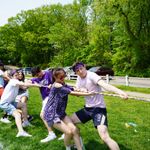
One Trusted Adult
I recently read Brooklyn Raney’s One Trusted Adult. A longtime independent school teacher, coach, and administrator, Raney surveys the research – and provides page after page of colorful anecdotes drawn from her experience in schools – about how critical it is that an adolescent feels a connection to at least one trusted adult mentor outside the home. The research tells us that that kind of relationship is a protective factor against a range of behavioral and mental health issues. It also opens the door to student learning, productivity, curiosity, and engagement in school and beyond; kids learn when they feel safe and seen. These insights are why we commit so deeply to our advising system, insist on small classes, encourage one-on-one extra help with teachers, and aspire that every one of our students will be known and loved by the adults in this community.
Raney also discusses the seemingly contradictory – but deeply important – insight that adult-student boundaries are a key ingredient in creating that close connection. Every year during our faculty-staff in-service retreat, we engage in training with outside counsel on boundaries; we review policies and discuss a series of case studies to explore what is appropriate mentorship and what crosses the line. Student safety concerns are paramount. But we also dig into this work to reinforce what the research tells us: kids may say they want their teachers to be their friends, but what they really need are mentors – adults who care for them enough to create appropriate distance and guardrails in order to give students the space they need to get their needs met.
While the book is written for educators, it may be interesting for parents as well and is a quick, entertaining read.
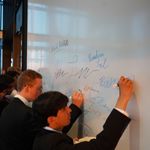
Our Seniors
Last night, the faculty and staff gathered with our seniors and their families to celebrate the Class of 2023. It was an intimate moment before Monday’s public commencement ceremony. We heard an emotionally powerful reflection by senior Lizzie Seward, laughed along with a funny address by alumni relations director and fan favorite Mr. Stone, and marveled at an amazing video filmed and produced by senior Rohan Biju consisting of interviews of all of his classmates (I’m told there is a much longer version for seniors’ eyes only – hmm). Mostly, it gave us a chance to be together and enjoy one another’s company.
That, to me, is a defining characteristic of the Class of 2023: strong, tight, loyal bonds. This group has come through the storm. As ninth graders, they went home in March 2020 to end the year remotely. They came back as sophomores to a school that offered in-person learning but where many of our traditions, social occasions, arts experiences, and athletic offerings were curtailed in light of the ongoing pandemic. Their junior year was marked by the tragic loss of one of their beloved teachers. During and likely because of these challenges, these young people formed remarkably close friendships. I saw those tight-knit circles of friendship in the room last night. I saw them in Rohan’s video. I have seen them every day in these hallways, on the fields, and in the junior-senior room. These are the friends who will offer advice and support through college and early careers, celebrate their weddings and the births of their children, and stay with them. Through a particularly challenging four years, this group has given itself a gift: lifelong friendship.
The Class of 2023 – talented, hard-working, competitive, curious, diverse – will leave this school in a few days better than they found it and will leave us all with a lesson in what matters most: relationships.
